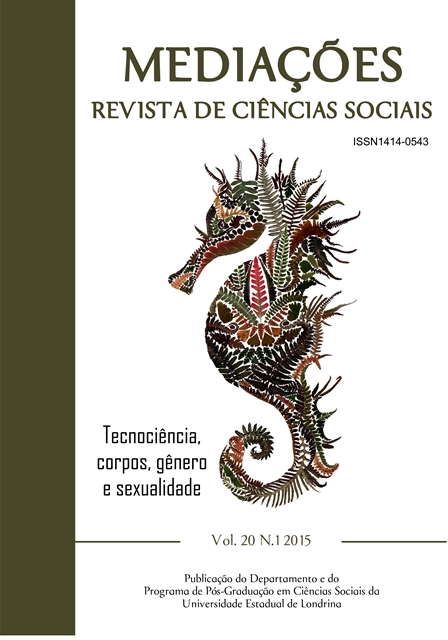Techno-Redemption of transsexual bodies: Appropriation of technology and Self-Management of Unfinished identities
DOI:
https://doi.org/10.5433/2176-6665.2015v20n1p239Keywords:
Bioscience, Transsexuality, Body, Cyborg identitiesAbstract
In this paper, we want to explore the modifications and procedures that delineate limits between the notions of body, sexuality, and nature. Based on ethnographic fieldwork in public institutions of Buenos Aires and La Plata (Argentina), we examine the medical-legal process concerning "sex reassignment" in transsexual people, which illuminates the unfold senses about the plasticity and precariousness of 'human essences', as well as the tensions between what human is (identity) and what he/she wants to be (project). We discuss the proposals of transhumanism, accepting that the soteriological dimension of biosciences enable the hopes of techno-redemption. Finally, we intend to contribute with a reflection about the role of scientific categories and the political perspective of the emergence of identities and collective resistances about the tutelage of cognitive and material control of the biosciences.Downloads
References
BOSTROM, Nick. A history of transhumanist thought. Journal of Evolution and Technology, v. 14, n. 1, p. 1-25, 2005.
BOSTROM, Nick. Una historia del pensamiento transhumanista. Argumentos de Razón Técnica, n. 14, p. 157-191, 2011.
BUTLER, Judith. El género en disputa. El feminismo y la subversión de la identidad. Buenos Aires: Ed. Paidós, 2001.
DÍAZ CRUZ, Rodrigo. Al acecho de la perfección. Transhumanismo, el cuerpo oscuro y la vía religiosa de la tecnociencia. Antropología. Boletín Oficial del INAH, n. 87, p. 29-45, 2009.
DAVIS, Kathy. Reshaping the Female Body: The Dilemma of Cosmetic Surgery. New York: Routledge, 1995.
DELLACASA, María Alejandra. Un enfoque antropológico de los procesos diagnósticos, protocolos y rutinas de intervención terapéutica en personas transexuales. 2013. Tesis (Maestría en Filosofía y Letras) - Universidad de Buenos Aires, Buenos Aires, 2013a.
DELLACASA, María Alejandra. Tecnologías biomédicas y producción de cuerpos sexuados: la cirugía de "cambio de sexo" en personas transexuales. Actas de la X Reunión de Antropología del Mercosur - Universidad Nacional de Córdoba, Argentina, 2013b.
D'ODORICO, María Gabriela. Figuras de lo humano en el nuevo orden tecnológico. Discusiones sobre el devenir político de nuestra especie. Ciencias Sociales: Monstruos y monstruosidades, Revista de la Facultad de Ciencias Sociales de la Universidad de Buenos Aires, n. 14, p. 6-13, 2014.
DURANTI, Roberto. Consideraciones específicas sobre el tratamiento hormonal. En: Atención de la Salud de personas travestis y transexuales. Publicación de la Coordinación Sida, GCBA, ONUSIDA, 2007.
ESFANDIARY, Fereidoun. Are you a transhuman?:Monitoring and stimulating your personal rate of growth in a rapidly changing world. New York, NY: Warner Books, 1989.
FIRESTONE, Shulamith. The dialectic of sex; the case for feminist revolution. New York, Morrow, 1971.
FOUCAULT, Michel. La verdad y las formas jurídicas. Barcelona: Gedisa, 1995.
FREIDSON, Elliot. La profesión médica. Barcelona: Ed. Península, 1978.
GRAHAM, Elaine. Representations of the Post/Human. Monsters, Aliens and Others in Popular Culture. New Brunswick, New Jersey: Rutgers University Press, 2002.
HARAWAY, Donna. Ciencia, cyborgs y mujeres: La reinvención de la naturaleza. Madrid: Cátedra, 1991.
HUXLEY, Julian. Religion without Revelation. London: Benn, 1927.
JASANOFF, Sheila. States of knowledge: the co-production of science and social order. New York: Routledge, 2004.
LATOUR, Bruno. Nunca hemos sido modernos. Madrid: Debate, 1993.
MANZOCCO, Roberto. Una nuova Torre di Babele. Esseri Umani 2.0. Milan: Springer, 2014. p. 45-116.
MORE, Max. Transhumanism: Toward a Futurist Philosophy. Extropy 6 (Summer), 1990, p. 6-12.
NOBLE, David. La religión de la tecnología. Buenos Aires: Paidós, 1999.
OUDSHOORN, Nelly. Beyond the Natural Body: An Archeology of Sex Hormones. London: Routledge, London, 1994.
PEARCE, David. The hedonistic Imperative, 2004. Disponible en Acceso en abril de 2015.
PRECIADO, Beatriz. Testo Yonqui. Madrid: Espasa Calpe, 2008.
RABINOW, Paul. Science as Practice: Ethos, Logos, Pathos, En: Rabinow, P. Essays of the Anthropology of Reason. New Jersey: Princenton University Press, 1996.
REPÚBLICA ARGENTINA, Boletín Oficial. Ley de Identidad de Género. Ley N° 23.743-n. 32.404, 24 de Mayo de 2012.
ROCA, Alejandra. Del Esencialismo a la Historicidad, enfoques en C&T y Género. Dimensiones Sociales de las Nuevas Tecnologías aplicadas a la salud y el cuerpo; su tratamiento en medios gráficos de comunicación masiva. 2006. Tesis (Maestría en Política y Gestión de la Ciencia y la Tecnología) - Universidad de Buenos Aires, 2006.
ROCA, Alejandra. Metáforas y analogías en la construcción de conocimiento: el género y el problema de la neutralidad y autonomía en C&T. En: Actas de la VII Reunión de Antropología del Mercosur, UFRGS, Porto Alegre, Brasil, 2007.
ROCA, Alejandra. Fragmentos, fronteras y cuerpos incógnitos. Una mirada antropológica sobre la producción y criopreservación de vida en el laboratorio. 2010. Tesis (Doctorado en Filosofía) - Universidad de Buenos Aires, Buenos Aires, 2010.
ROCA, Alejandra. Todo conocimiento es político: sólo se trata de saber quién es el amo. Revista Espacios, n. 48, Número especial: Luces y sombras de las Humanidades, Dossier: "Pensar Filo" como "Humanidades", FFYL, UBA, 2012. p. 1-14.
VILACA Murilo, MARIANO Y PALMA, Alexandre. Límites biológicos, bio-tecnociencia y trans-humanismo: ¿una revolución en Salud Pública? Interface Comunic., Saude, Educ (Botucatu) [online]. Epub, v. 16, n. 43 p. 1025-1038, 30 nov. 2012.
Downloads
Published
How to Cite
Issue
Section
License
Copyright (c) 2015 Alejandra Roca, María Alejandra Dellacasa

This work is licensed under a Creative Commons Attribution 4.0 International License.
Copyright on articles published in Mediações belongs to the author(s): in the case of partial or entire republication of the original publication, we ask author(s) to indicate the original publication in the periodical.
Mediações uses the Creative Commons Attribution 4.0 International license, which allows Open Access, enabling any user to read, download, copy and disseminate its content so long as adequately referenced.
The opinions expressed by the author(s) are their sole responsibility.

































